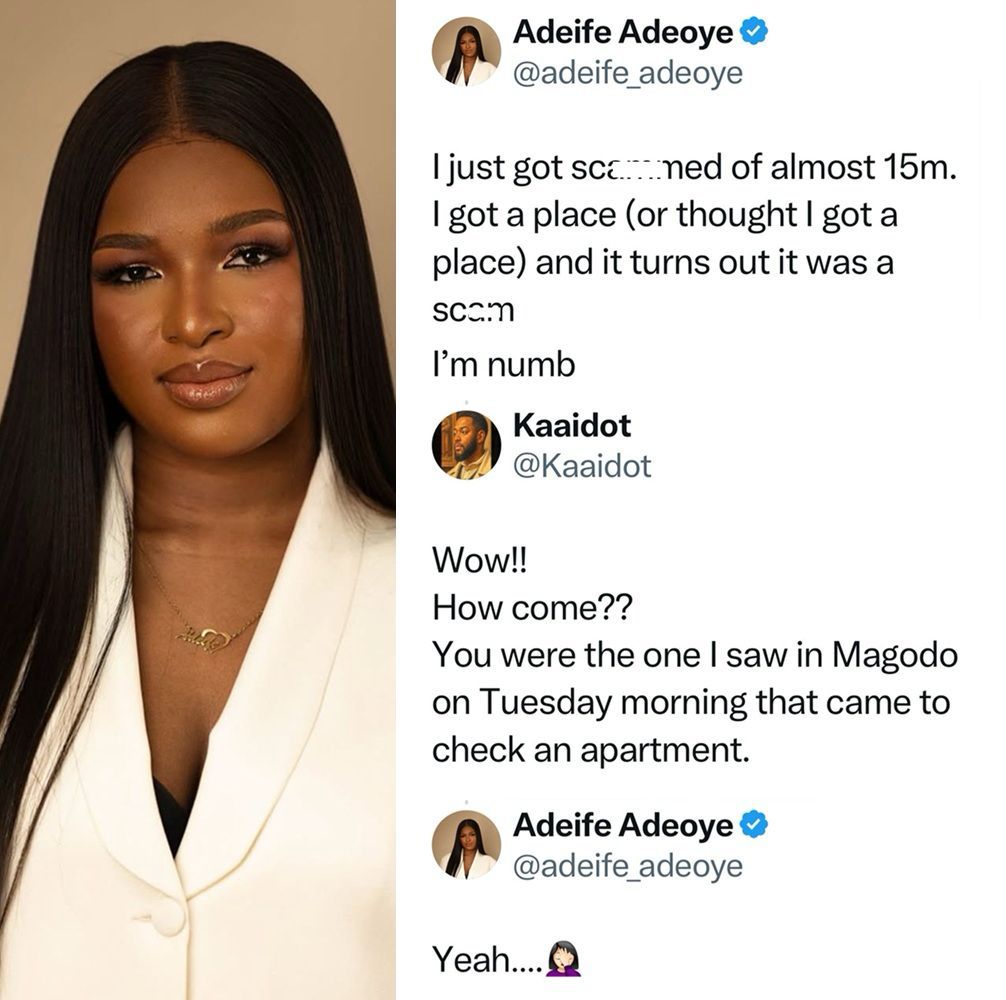
Shock and Tears as Content Creator Adeife Loses ₦15 Million to Lagos House Rental Scam

In a devastating turn of events that has left fans and fellow creatives stunned, Nigerian content creator Adeife Adeoye has revealed that she was recently scammed of almost ₦15 million in what appears to be a sophisticated house rental fraud in Lagos. The shocking confession, which Adeife shared on her social media handle, has quickly gone viral, sparking widespread outrage, sympathy, and renewed conversations about the alarming rate of rental scams in Nigeria’s bustling commercial capital.
“I just got scammed of almost ₦15m. I got a place (or thought I got a place) and it turns out it was a scam. I'm numb,” Adeife wrote, her pain evident in the rawness of her words. The simplicity of her statement captured the sheer devastation of losing such a significant amount of money — money that represented not just financial investment, but hopes, dreams, and the promise of a new chapter. For Adeife, known for her vibrant and engaging online presence, this betrayal was deeply personal and public.
In a shocking twist that added even more depth to the unfolding story, another social media user, Kaaidot, responded with recognition, recalling seeing Adeife just days earlier inspecting an apartment in Magodo, a highbrow area of Lagos. “Wow! How come?? You were the one I saw in Magodo on Tuesday morning that came to check an apartment,” he wrote. Adeife’s response was heartbreaking in its confirmation: “Yeah...” Her brief reply carried the heavy weight of regret and disbelief, emotions shared by many who followed the thread in real time.
Rental scams are unfortunately not new in Lagos, a city known for its high demand for housing and fierce competition for decent apartments. Scammers have continued to take advantage of this desperate need, setting elaborate traps that often appear legitimate to even the most careful renters. In Adeife’s case, it seems the fraud was carried out with an alarming level of sophistication, enough to convince a savvy and well-informed individual like her.
The reactions from the public have been a mixture of sympathy, anger, and calls for urgent reform. Many empathized with Adeife’s situation, acknowledging how easy it is to fall prey to such traps in a system that offers little protection for victims. Others expressed outrage at how scammers are emboldened by the lack of accountability and weak enforcement of property regulations. In a city where moving houses is often a stressful endeavor involving agents, landlords, and a maze of hidden costs, trust is a rare and costly commodity.
Adding another dimension to the conversation was a resurfaced message from fellow influencer Enioluwa Adeoluwa, who had earlier criticized Nigerian society’s growing normalization of suffering and disregard for human dignity. “Again, the central issue is the lack of value placed on a human life. We have become so familiar with death in this part of the world that we now think it is OKAY for someone to die. Such a dangerous thing,” Enioluwa had written in a different context. But his words eerily echoed the emotions stirred by Adeife’s tragedy — a society where loss, betrayal, and even death are often met with a disturbing level of indifference.
Adeife’s loss is not just a personal financial blow; it is a chilling reminder of how broken systems continue to allow criminality to thrive, leaving innocent citizens vulnerable. ₦15 million is a life-changing sum for many Nigerians. It could represent years of savings, countless sacrifices, and the hopes of building a stable, secure future. That such an amount could be wiped away in the blink of an eye — with little hope of recovery — is a damning indictment of the current state of affairs.
For young Nigerians like Adeife, who have carved out successful careers through creativity, consistency, and hard work, experiences like this cut especially deep. They serve as painful reminders that no matter how far one rises, no one is truly safe from the daily dangers that have become normalized in Nigerian life. Fraud, insecurity, and systemic failure continue to lurk around every corner, threatening to undermine the progress of even the brightest and most diligent.
As Adeife’s story continues to spread, many have called for a thorough investigation into the incident. Some have suggested that property listings in Lagos be better regulated and verified through official channels to reduce the risk of scams. Others have proposed the creation of a trusted, centralized database where prospective tenants can confirm the authenticity of property agents and landlords before making payments. However, as with many such crises, there is also a prevailing sense of cynicism — a fear that, like many injustices before it, Adeife’s experience might soon be forgotten without any real systemic change.
The personal impact on Adeife cannot be overstated. Losing such an amount not only represents financial ruin for many but also deals a heavy emotional and psychological blow. Trust is shattered, hope is shaken, and the exhausting battle to rebuild begins. For a public figure like Adeife, the added pressure of living through such a traumatic experience in the public eye can make the road to healing even harder.
Still, if there is one thing that shines through the darkness of this story, it is the resilience that Nigerian youth continue to demonstrate in the face of relentless adversity. Many of Adeife’s fans and friends have flooded her social media with messages of support, urging her not to lose hope and promising that brighter days will come. In a society where the odds often seem insurmountable, this spirit of solidarity — of standing with one another through storms — remains one of the few unbreakable threads holding people together.
Adeife’s heartbreaking revelation has sparked an important national conversation — one about the urgent need to protect citizens, to value life and livelihoods, and to demand more from the systems that continue to fail them. It is a conversation that must not be allowed to fade away. Because in a world where ₦15 million can vanish overnight and lives can be derailed without consequence, speaking out — and demanding better — is no longer just an option. It is a necessity.


